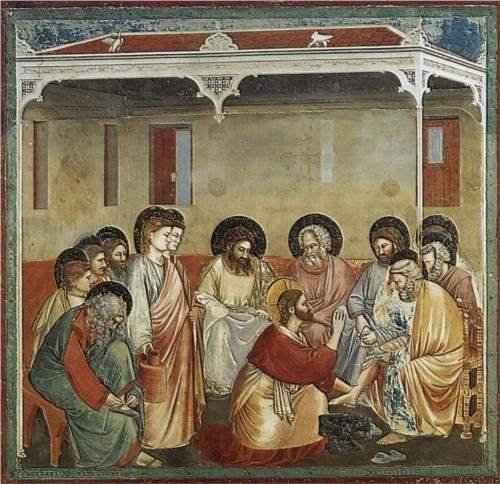For the past little while, since I’ve been engaging with hostile Protestants, I’ve been increasingly troubled. Because to my Protestant-steeped brain, their reading of the Apostle Paul sounds correct—the way I’ve been raised up to read him. I’ve struggled to read the Catholic idea of “justification through faith plus works” in his thought (even though I know this is a Protestant misrepresentation), and aside from the few verses I’ve explicated, it has been disturbingly difficult. What if we Catholics have Paul wrong? What if Luther was right? What if he really does mean sola fide, justification by faith alone?
At the same time, I’ve been more comfortable with our reading of Saint James and of Jesus Himself; and I’ve recalled the charge I’ve heard all my academic life, that Paul preached a different Gospel than Christ. I’ve never believed that. Both Catholics and Protestants find ways to read Scripture to make it appear internally consistent to themselves; it certainly is possible. But it is very clear that Paul was thinking along different lines than either Jesus or James; he was confronting different problems. Jesus never propounded anything resembling justification by faith alone. It is very clear that Protestants, particularly the Reformed variety, emphasize Paul and sola fide to the exclusion of all other interpretations; they force Jesus and James into their own framework of sola fide. They likewise accuse us of the same thing, of forcing Paul into our framework of “works’ righteousness.”
I’ve been writing recently and vehemently that the Catholic Church does not teach “works’ righteousness”—that it is through our works, done by the grace of God, that we are saved, not by our works, done in our own power (see Philippians 2:12-13). God working in us, through our works, justifies us and sanctifies us; but I haven’t really thought about what it is that is actually occurring in us as this happens. Last night I read a piece by Bryan Cross of Called to Communion that has profoundly affected me; provided me with this missing puzzle piece I didn’t even know I was lacking; shone light on the key to the Catholic understanding of salvation; given the glue that binds together what Jesus said and what James said and what John said and what Peter said and what Paul said, what God has said throughout the entire Bible:
… It’s love. Love is the key. Not faith alone. Not faith and works. Because even if I understand all mysteries and all knowledge, and if I have all faith, but have not love, I have nothing; I am just a clanging cymbal (1 Corinthians 13:1-2). Anyone who does not love does not know God, because God is love (1 John 4:8). Faith by itself, if it does not have works, is dead (James 2:14-26)—but what works? Works of love. Jesus said that the greatest commandments are to love the Lord our God with all our heart, all our mind, all soul, and all our strength, and to love our neighbor as ourselves (Luke 10:27). And how do we love God? We keep his commandments (John 14:15). Love does no wrong to a neighbor; therefore love is the fulfillment of the law (Romans 13:10).
This has been staring me in the face all along, and it hasn’t clicked. I’ve worn out the section on grace and justification in my copy of the Catechism (or at least I would have, if I were still carrying my paper copy)—and yet I haven’t seen it. The word “love” is used eleven times in that section alone; “charity” is used another eleven. Love—agape (ἀγάπη)—charity (caritas)—all three words refer to the same idea—is at the core of Catholic teaching; as it well should be, since it is at the core of Scripture.
Bryan brilliantly illustrated this to me clearly for the first time in his explication of the thought of St. Irenaeus (c. 125–c. 202) toward justification, and in his piece, which I hadn’t read before but read immediately following, on the soteriology of Pope St. Clement of Rome. Though our doctrine today is more fully developed, both early Fathers reflect these ideas. And if we read Paul with this understanding, then everything makes sense.
If we have faith, but have not love, then our faith is in vain. It is only having faith in love that accomplishes anything toward our justification. If we do good works, but don’t do them in love, then they are empty and meaningless. If we love God, we will obey His commandments. If we continue to disobey God, how can that be love? “If anyone says he loves God, but hates his brother, he is a liar. . . . God is love, and whoever abides in love abides in God, and God abides in him” (1 John 4:20, 16). “No one who abides in Him keeps on sinning; no one who keeps on sinning has either seen Him or known Him” (1 John 3:6).
The Reformers would have us believe that we are totally depraved; that even our good works are filthy rags before God; that the entire purpose of the Law was to prove that we couldn’t keep it, that we were morally bankrupt without salvation, and even with it, we are just and sinners at the same time (simul justus et peccator). And yet all throughout Scripture—in the Old Testament, and in the teachings of Jesus, Peter, Paul, James, and John, we are called to obedience and holiness (1 Peter 1:13-35). We are told again and again that we will be judged according to our deeds (Matthew 16.27, 1 Peter 1:17, Romans 2:6, Revelation 20:13)—and yet Protestants tell us that we are incapable of living by God’s Law; that our works do not matter as long as they are covered by Christ’s imputed righteousness. I have said before that I never felt much inclination as a Protestant to pursue holiness, feeling that my sin was “covered.” Now I see how starkly the Protestant view misses the main idea of Scripture: We are to obey God’s commandments, because we love Him, through the grace which He gives us by the Blood of Christ. It is through living in His grace, growing in His love, conforming ourselves to His image, that we are saved. Faith and works are both just active parts of that.


